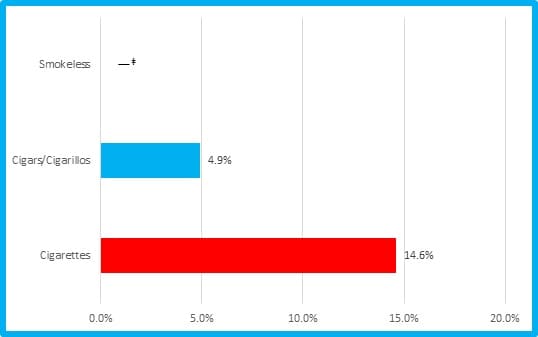Here are some interesting facts provided by the Center for Disease Control and Prevention.
Although African Americans usually smoke fewer cigarettes and start smoking cigarettes at an older age, they are more likely to die from smoking-related diseases than Whites.3,4,5,6,7,8

Tobacco Use Prevalence
Current Tobacco Use* Among African American Adults—2016†9

* “Current Use” is defined as self-reported consumption of cigarettes, cigars, or smokeless tobacco in the past month.
† Data taken from the National Survey on Drug Use and Health, 2018, and refer to African American adults aged 18 years and older.
‡ Dashes indicate prevalence estimates with a relative standard error > 30% and are not presented.
Health Effects
Tobacco use is a major contributor to the three leading causes of death among African Americans—heart disease, cancer, and stroke.3,4,5
- Diabetes is the fourth leading cause of death among African Americans.4 The risk of developing diabetes is 30–40% higher for cigarette smokers than nonsmokers.10
Patterns of Tobacco Use
- African American youth and young adults have significantly lower prevalence of cigarette smoking than Hispanics and Whites.11
- Although the prevalence of cigarette smoking among African American and White adults is the same, African Americans smoke fewer cigarettes per day.3,6
- On average, African Americans initiate smoking at a later age compared to Whites.3,6
Secondhand Smoke Exposure
African American children and adults are more likely to be exposed to secondhand smoke than any other racial or ethnic group.12
- During 2013-2014, secondhand smoke exposure was found in:
- 66.1% of African American children aged 3–11 years.12
- 55.3% of African American adolescents aged 12–19 years.12
- 45.5% of African American adults aged 20 years and older.12
- African American nonsmokers generally have higher cotinine levels (an indicator of recent exposure to tobacco smoke) than nonsmokers of other races/ethnicities.12

Quitting Behavior
Most African American adult cigarette smokers want to quit smoking, and many have tried.10,13
- Among African American current daily cigarette smokers aged 18 years and older:
- 72.8% report that they want to quit compared to 67.5% of Whites, 69.6% of Asian Americans, 67.4% of Hispanics, and 55.6% of American Indians/Alaska Natives.13
- 63.4% report attempting to quit compared to 56.2% of Hispanics, 53.3% of Whites, and 69.4% of Asian Americans.13
- Despite more quit attempts, African Americans are less successful at quitting than White and Hispanic cigarette smokers, possibly because of lower utilization of cessation treatments such as counseling and medication.3,13
Tobacco Industry Marketing and Influence
Targeted Marketing
- The tobacco industry has aggressively marketed menthol products to young people and African Americans, especially in urban communities.14 Historically, the tobacco industry’s attempts to maintain a positive image among African Americans have included such efforts as supporting cultural events and making contributions to minority higher education institutions, elected officials, civic and community organizations, and scholarship programs.3
- Tobacco companies have historically placed larger amounts of advertising in African American publications, exposing African Americans to more cigarette ads than Whites.3
Menthol Cigarette Advertising
- Historically, the marketing and promotion of menthol cigarettes have been targeted heavily toward African Americans through culturally tailored advertising images and messages.14,15
- Over 7 out of 10 African American youth ages 12-17 years who smoke use menthol cigarettes16
- African American adults have the highest percentage of menthol cigarette use compared to other racial and ethnic groups.17
- Menthol in cigarettes is thought to make harmful chemicals more easily absorbed in the body, likely because menthol makes it easier to inhale cigarette smoke.3,18
- Some research shows that menthol cigarettes may be more addictive than non-menthol cigarettes.19
Price Promotions, Retail, and Point-of-Sale Advertising
- Tobacco companies use price promotions such as discounts and multi-pack coupons—which are most often used by African Americans and other minority groups, women, and young people—to increase sales.20
- Areas with large racial/ethnic minority populations tend to have more tobacco retailers located within them, which contributes to greater tobacco advertising exposure.20
- Menthol products are given more shelf space in retail outlets within African American and other minority neighborhoods.20
